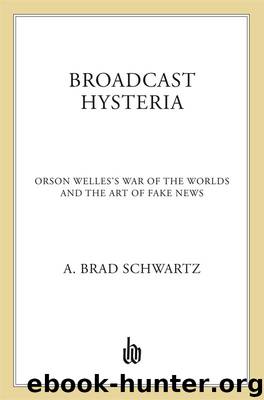Broadcast Hysteria : Orson Welles's War of the Worlds and the Art of Fake News by Schwartz A. Brad

Author:Schwartz, A. Brad
Language: eng
Format: epub
ISBN: 9780809031634
Publisher: Macmillan
10
“The Horror Man”
There is one thing certain … Your future is a brilliant one.
—Margaret C. Brockmeyer of Baltimore to Orson Welles, October 31, 19381
Less than two weeks before The Invasion from Mars was set to go on sale, Hadley Cantril received a sternly worded letter from Orson Welles. The Princeton University Press had sent Welles an advance copy of the book, in hopes that he might write a blurb for its dust jacket. Welles said that he would be happy to, if not for one thing. The study, he wrote, “in its present form contains an error so grave, and in my opinion so detrimental to my own reputation that I cannot in all fairness speak well of it until some reparation is made.” He referred to three mentions in the text of Howard Koch as the writer of War of the Worlds.2
Welles explained that the show had been “a collaboration of the best sort,” benefitting from the talents of John Houseman, Paul Stewart, Bernard Herrmann, and others in the Mercury Theatre. “To credit the broadcast version to [Koch] with the implication that its conception as well as its execution was his is a gross misstatement of fact,” Welles wrote, “and one which I am sure you will not care to tolerate in an otherwise careful and accurate account.”3 Four days before the book’s release, Cantril sent Welles a suggested change in the credit line for future printings:
SCRIPT IDEA AND DEVELOPMENT BY ORSON WELLES ASSISTED BY JOHN HOUSEMAN AND MERCURY THEATER [sic] STAFF AND WRITTEN BY HOWARD KOCH UNDER DIRECTION OF MR WELLES4
If Welles had really wanted to acknowledge his collaborators, this should have satisfied him. But it didn’t. Within hours, he sent Cantril a desperate and almost incoherent telegram, claiming that the byline would harm his “PROFESSIONAL PRESTIGE AND POSITION IN THE THEATRE WORLD.”5 Welles didn’t want to spread credit around; he just wanted Koch’s name out of the book entirely.
As Welles’s biographer Simon Callow has observed, there is more in Welles’s response than simple egomania.6 By the spring of 1940, Welles had just about worn out his welcome in Hollywood. Rumors swirled that this inexperienced kid would never manage to make a movie, and would thus let his unprecedented contract go totally to waste. The first two films he proposed to RKO—an adaptation of Joseph Conrad’s Heart of Darkness, and a thriller called The Smiler with a Knife—both withered in preproduction. At the time of his flap with Cantril, Welles had only just begun work on his latest film idea: the life story of a newspaper tycoon, tentatively titled American (and later retitled Citizen Kane). Whether it, too, would fall by the wayside remained anyone’s guess.7
Welles was still finding his way, experimenting as he had in the Mercury, but on a much costlier canvas. And once again, his company was dangerously close to insolvency. When Houseman relayed this information to Welles, at a meeting in a Beverly Hills restaurant, the long-simmering tension between them finally exploded. Houseman later wrote that he deliberately provoked Welles into the much-needed confrontation.
Download
This site does not store any files on its server. We only index and link to content provided by other sites. Please contact the content providers to delete copyright contents if any and email us, we'll remove relevant links or contents immediately.
| Antennas | Microwaves |
| Mobile & Wireless | Networks |
| Radar | Radio |
| Remote Sensing & GIS | Satellite |
| Signal Processing | Telephone Systems |
| Television & Video |
Whiskies Galore by Ian Buxton(41981)
Introduction to Aircraft Design (Cambridge Aerospace Series) by John P. Fielding(33113)
Small Unmanned Fixed-wing Aircraft Design by Andrew J. Keane Andras Sobester James P. Scanlan & András Sóbester & James P. Scanlan(32785)
Craft Beer for the Homebrewer by Michael Agnew(18225)
Turbulence by E. J. Noyes(8014)
The Complete Stick Figure Physics Tutorials by Allen Sarah(7361)
The Thirst by Nesbo Jo(6920)
Kaplan MCAT General Chemistry Review by Kaplan(6919)
Bad Blood by John Carreyrou(6606)
Modelling of Convective Heat and Mass Transfer in Rotating Flows by Igor V. Shevchuk(6424)
Learning SQL by Alan Beaulieu(6269)
Weapons of Math Destruction by Cathy O'Neil(6254)
Man-made Catastrophes and Risk Information Concealment by Dmitry Chernov & Didier Sornette(5993)
Digital Minimalism by Cal Newport;(5743)
Life 3.0: Being Human in the Age of Artificial Intelligence by Tegmark Max(5539)
iGen by Jean M. Twenge(5401)
Secrets of Antigravity Propulsion: Tesla, UFOs, and Classified Aerospace Technology by Ph.D. Paul A. Laviolette(5363)
Design of Trajectory Optimization Approach for Space Maneuver Vehicle Skip Entry Problems by Runqi Chai & Al Savvaris & Antonios Tsourdos & Senchun Chai(5058)
Pale Blue Dot by Carl Sagan(4990)
